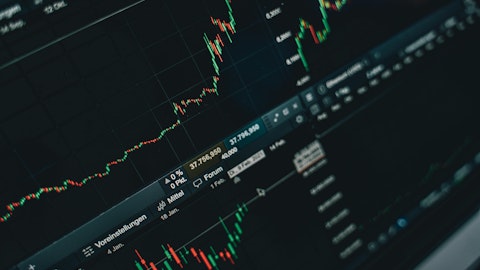In this article, we will take a look at some of the best high-yield dividend stocks for steady cash flow.
US equity funds witnessed renewed investor interest during the week ending October 15, supported by signals of further rate cuts from Federal Reserve Chair Jerome Powell and a strong start to the corporate earnings season. These factors helped ease worries about trade tariffs and a possible government shutdown.
According to data from LSEG, investors poured a net $1.04 billion into US equity funds, recovering nearly a quarter of the $4.45 billion was withdrawn the previous week.
In addition, US sectoral funds continued to attract inflows for the fourth consecutive week, receiving about $4.39 billion in total. Technology and financial sector funds led the way, with inflows of roughly $1.18 billion and $920 million, respectively.
Meanwhile, global funds focused on dividend-paying stocks have seen strong demand this year after two years of sluggish interest, as investors turn to income-generating assets amid economic and geopolitical uncertainty. Dividend-rich sectors such as utilities and energy have gained appeal in 2025. LSEG’s Lipper data shows that global dividend-focused exchange-traded funds brought in $23.7 billion in the first half of 2025, which was their highest inflows in three years.
Given this, we will now take a look at some of the best dividend stocks.

Our Methodology
For this list, we selected dividend stocks with yields above 3% as of October 21, focusing on companies that offer stronger income potential than the market average. In addition to yield strength, we emphasized consistency and selected companies that have maintained stable dividend payments over time and demonstrated disciplined payout policies. This approach helps identify firms with reliable cash flows and shareholder-friendly management practices, which are key indicators of long-term dividend sustainability. The stocks are ranked according to their dividend yields.
Why are we interested in the stocks that hedge funds pile into? The reason is simple: our research has shown that we can outperform the market by imitating the top stock picks of the best hedge funds. Our quarterly newsletter’s strategy selects 14 small-cap and large-cap stocks every quarter and has returned 427.7% since May 2014, beating its benchmark by 264 percentage points (see more details here).
11. Albertsons Companies, Inc. (NYSE:ACI)
Dividend Yield as of October 21: 3.01%
Albertsons Companies, Inc. (NYSE:ACI) is one of the largest grocery retailers in the US, operating across 34 states and Washington, D.C. The brand has become a familiar name for many shoppers and remains one of the top choices for groceries in most major cities.
On October 20, Tigress Financial Partners raised its price target for Albertsons Companies, Inc. (NYSE:ACI) to $29.00, up from the previous level, while reiterating a Buy rating on the stock. The revision came after the company’s strong Q2 2026 performance, which showed steady sales growth, improved profitability, and continued momentum in its digital transformation. Albertsons, which generates around $81.37 billion in annual revenue and holds a market capitalization of $10.85 billion, reported a 2.08% year-over-year rise in revenue and maintains a 3.04% dividend yield.
Tigress pointed out that Albertsons Companies, Inc. (NYSE:ACI)’s growth is being driven by advancements in AI-powered digital sales, a growing loyalty program, and its high-margin retail media business. The firm also underscored the potential of Albertsons Media Collective, viewing it as a major long-term growth catalyst expected to boost both revenue and margins over the next few years through data monetization, omnichannel expansion, and new advertiser solutions.
In addition, the firm took note of Albertsons Companies, Inc. (NYSE:ACI)’s recent approval of a $750 million accelerated share repurchase plan, along with its continued focus on growth investments such as enhancing digital capabilities, opening new locations, and upgrading existing stores.
Albertsons Companies, Inc. (NYSE:ACI) is also known for its consistent dividend policy. The company currently offers a quarterly dividend of $0.15 per share and has a dividend yield of 3.01%, as of October 21.
10. M&T Bank Corporation (NYSE:MTB)
Dividend Yield as of October 21: 3.30%
M&T Bank Corporation (NYSE:MTB) is a regional financial institution with a solid presence across multiple states, offering a wide range of community, commercial, and retail banking services.
On October 20, DA Davidson adjusted its outlook on the stock, trimming the price target to $222.00 from $224.00 while keeping a Neutral rating. The firm expects 2026 to be a more favorable year for M&T Bank Corporation (NYSE:MTB), anticipating that the current challenges in commercial real estate could turn into growth opportunities, supporting an improvement in average earning assets.
DA Davidson also mentioned that the bank’s management foresees continued strength in net interest margin expansion and fee income growth, along with healthier credit quality reflected in fewer criticized loans.
In its commentary, the research firm noted that M&T Bank Corporation (NYSE:MTB) has expressed openness to participating in potential merger & acquisition opportunities as market activity picks up, though CFO Daryl Bible clarified that no immediate deals are in the pipeline. According to DA Davidson, this possible M&A activity could act as a short-term drag on the stock, which contributed to the firm’s decision to slightly lower its price target while maintaining a Neutral stance.
That said, M&T Bank Corporation (NYSE:MTB) is popular among income investors because of its stable dividend history and above-average dividend yield. The company has been growing its payouts for nine consecutive years and offers a quarterly dividend of $1.50 per share. The stock supports a dividend yield of 3.30%, as of October 21.
9. ConocoPhillips (NYSE:COP)
Dividend Yield as of October 21: 3.61%
ConocoPhillips (NYSE:COP) stands among the world’s largest independent oil and gas exploration and production companies, backed by significant reserves and output.
On October 16, Wells Fargo reaffirmed its Equal Weight rating on the stock and kept its price target at $100.00, indicating limited upside potential from current levels. The decision came from a team of analysts led by Roger Read, who maintained a neutral view on the company’s shares.
Wells Fargo’s stance reflects a cautious outlook as investors closely watch global energy trends, including supply conditions and demand expectations, which continue to influence the sector’s performance.
ConocoPhillips (NYSE:COP) has continued to show resilience in a volatile energy market, supported by a 3.6% dividend yield and an impressive 55-year streak of uninterrupted dividend payments. The company has also increased its dividend for 10 consecutive years, reinforcing its appeal among income-focused investors. It currently offers a quarterly dividend of $0.78 per share.
8. Philip Morris International Inc. (NYSE:PM)
Dividend Yield as of October 21: 3.87%
Philip Morris International Inc. (NYSE:PM) is a leading American tobacco company whose products are available in more than 180 countries worldwide.
On October 21, Stifel reaffirmed its Buy rating and $186.00 price target on Philip Morris International Inc. (NYSE:PM), following the company’s strong third-quarter results, which surpassed expectations in organic sales, profit margins, and earnings per share growth.
Philip Morris International Inc. (NYSE:PM) raised the lower end of its 2025 EPS forecast, helped by a reduced tax rate and lower interest expenses. However, it trimmed its operating profit guidance to 10%-11.5% from the earlier 11-12.5%, citing higher investments in the US market, particularly increased promotional spending on its ZYN nicotine pouch brand.
For the fourth quarter, Philip Morris International Inc. (NYSE:PM) expects low to mid-single-digit operating profit growth, slightly under earlier projections, mainly because of inventory challenges across its IQOS and ZYN product lines. The company estimates a 20-30 million can inventory headwind for ZYN in the coming quarter.
Although the stock has fallen nearly 18% from its June peak, Stifel considers the decline a buying opportunity, emphasizing that the anticipated fourth-quarter softness does not reflect the company’s underlying earnings momentum. The firm believes Philip Morris is on track to deliver EPS growth consistent with its medium-term target range of 9-11% heading into 2026.
Philip Morris International Inc. (NYSE:PM) is also popular among income investors because of its dividend growth. The company has been rewarding shareholders with growing dividends for the past 16 consecutive years. Currently, it offers a quarterly dividend of $1.47 per share and has a dividend yield of 3.87%, as of October 21.
7. International Paper Company (NYSE:IP)
Dividend Yield as of October 21: 3.88%
International Paper Company (NYSE:IP) manufactures a diverse range of paper, packaging, and cellulose fiber products- materials used in everyday items like diapers, baby wipes, and feminine hygiene products.
On October 17, Stifel upgraded its rating on International Paper Company (NYSE:IP) from Hold to Buy, setting a new price target of $57.80. The firm cited that the company is nearing a pivotal stage in its strategic transformation, which could lead to stronger profitability and margin expansion.
According to Stifel, the initial optimism surrounding the appointment of CEO Andy Silvernail has since stabilized, giving way to more balanced expectations. The firm highlighted that International Paper Company (NYSE:IP) has made tangible progress on its turnaround efforts, including the $1.5 billion sale of its underperforming Global Cellulose Fiber business. While market conditions remain subdued, Stifel expressed confidence that the company’s ongoing initiatives will help it advance toward its 2027 adjusted EBITDA goal of $5.5 billion to $6.0 billion.
The analysts noted, however, that the company still faces challenges, particularly around the integration of its DS Smith acquisition, but emphasized that IP now has a clearer strategic direction.
International Paper Company (NYSE:IP)’s strong dividend history is also a key attraction for income investors, as the company has maintained uninterrupted dividend payments since 1986. It currently offers a quarterly dividend of $0.4625 per share and has a dividend yield of 3.88%, as of October 21.
6. U.S. Bancorp (NYSE:USB)
Dividend Yield as of October 21: 4.37%
U.S. Bancorp (NYSE:USB) ranks among the leading financial institutions in the United States. Headquartered in Minneapolis, the company operates primarily through its subsidiary, U.S. Bank, which provides a wide range of services, including personal and commercial banking, wealth management, and payment processing.
On October 20, TD Cowen raised its price target on U.S. Bancorp (NYSE:USB) from $59.00 to $60.00 while maintaining a Buy rating. The firm credited the adjustment to a strong quarterly performance, noting revenue growth of 4.48% year-over-year, disciplined cost control, and steady gains in fee income.
According to TD Cowen, U.S. Bancorp (NYSE:USB) is “beginning to hit its stride” operationally, supported by improving fundamentals and exceptional results from its payments business, which the firm called the company’s “crown jewel.” The report also pointed out that USB shares trade at 9.2 times estimated 2026 earnings and 1.6 times expected 2025 tangible book value — levels the firm considers attractive given the company’s growth trajectory.
TD Cowen expects continued revenue momentum and further acceleration in the payments segment, reinforcing its positive view of the stock. The bank’s dividend track record also stands out, with 15 consecutive years of payout increases, appealing to long-term income investors. The company pays a quarterly dividend of $0.52 per share and has a dividend yield of 4.37%, as of October 21.
5. Portland General Electric Company (NYSE:POR)
Dividend Yield as of October 21: 4.67%
Portland General Electric Company (NYSE:POR) is a publicly traded utility based in Oregon that focuses on the generation, transmission, and distribution of electricity.
On October 17, UBS reaffirmed its Buy rating and $47.00 price target on the stock as the company awaits a ruling from the Oregon Public Utility Commission regarding its proposed 200 MW Seaside battery project. A final decision is expected soon. UBS stated that a favorable regulatory outcome could support Portland General Electric Company (NYSE:POR)’s earnings per share growth guidance of 5% to 7%. The firm also noted that it does not anticipate major surprises from the regulatory review.
According to UBS, the commission’s decision, which may be issued without a formal meeting, is likely to serve as a positive development for the company.
Apart from this, Portland General Electric Company (NYSE:POR) is a solid dividend company with 19 consecutive years of dividend growth under its belt. The company offers a quarterly dividend of $0.525 per share and has a dividend yield of 4.67%, as of October 21.
4. KeyCorp (NYSE:KEY)
Dividend Yield as of October 21: 4.68%
KeyCorp (NYSE:KEY) is an American financial services company headquartered in Ohio. The bank offers a wide range of related services and products to its consumers.
On October 20, TD Cowen lowered its price target on KeyCorp (NYSE:KEY) from $21.00 to $19.00 while maintaining a Hold rating on the stock. The firm cited potential merger and acquisition (M&A) risks as the main reason for its cautious outlook, even as it recognized the bank’s solid fundamentals and recent strong performance.
According to TD Cowen, KeyCorp (NYSE:KEY) delivered a strong third-quarter 2025 report, showing solid top-line growth and an improved earnings outlook. The bank demonstrated progress across its core operations, and analysts highlighted a clearer path toward achieving a 13–15% return on tangible common equity (ROTCE).
The firm clarified that its Hold rating reflects both the possibility of future M&A activity in the banking sector and KeyCorp’s relatively weak position in terms of deal-making “currency,” despite encouraging results.
KeyCorp (NYSE:KEY)’s dividend history also remains a key attraction for investors. The bank has paid consistent dividends since 1985, appealing to those seeking steady income. Its quarterly dividend currently comes in at $0.205 per share and has a dividend yield of 4.68%, as of October 21.
3. Eastman Chemical Company (NYSE:EMN)
Dividend Yield as of October 21: 5.34%
Eastman Chemical Company (NYSE:EMN) is a global specialty materials manufacturer that produces a wide variety of products used in everyday life.
On October 14, RBC Capital reduced its price target on Eastman Chemical Company (NYSE:EMN) from $74 to $71 while maintaining an Outperform rating. The revision came as part of a broader research note reviewing third-quarter expectations for chemical companies.
According to RBC, discussions with Investor Relations teams across the industry suggest that demand remained relatively soft during Q3. The firm noted that building and construction activity has been subdued, and although potential interest rate cuts could offer support, a weak labor market continues to weigh on new housing starts and existing home sales. In addition, demand for consumer durables has not shown significant improvement.
Despite near-term headwinds, Eastman Chemical Company (NYSE:EMN) remains attractive to income-focused investors, having increased its dividend for 15 consecutive years. The company offers a quarterly dividend of $0.83 per share and has a dividend yield of 5.34%, as of October 21.
2. The Kraft Heinz Company (NASDAQ:KHC)
Dividend Yield as of October 21: 6.25%
The Kraft Heinz Company (NASDAQ:KHC), along with its subsidiaries, produces and sells food and beverage products both in North America and across global markets. On October 20, UBS reaffirmed its Neutral rating and maintained a $27 price target for the stock ahead of the company’s third-quarter earnings release scheduled for October 29.
UBS described the current setup before earnings as “tricky,” pointing out that while market attention has shifted toward the company’s upcoming corporate split, investors are still uneasy about the company’s weak fundamentals, which have yet to show signs of recovery. The firm expects the third quarter to be difficult, citing two main concerns: persistent weakness in US sales trends, which have further declined, and ongoing margin pressures that are unlikely to ease.
The report noted that The Kraft Heinz Company (NASDAQ:KHC) shares have continued to lag behind since the second-quarter results, even though the stock appears undervalued relative to its historical averages. UBS said it plans to remain on the sidelines until there is clearer evidence of improving fundamentals or stronger confidence that the upcoming split will create meaningful shareholder value.
Despite these challenges, The Kraft Heinz Company (NASDAQ:KHC) continues to attract income-focused investors through its reliable and consistent dividend payments. The company offers a quarterly dividend of $0.40 per share and has a dividend yield of 6.25%, as of October 21.
1. Arbor Realty Trust, Inc. (NYSE:ABR)
Dividend Yield as of October 21: 10.17%
Arbor Realty Trust, Inc. (NYSE:ABR) is a mortgage real estate investment trust (mREIT) that specializes in financing multifamily properties. Its diversified business model allows it to generate income from several sources, including stable long-term cash flows through servicing fees, escrow income, and net interest income, along with one-time gains from origination fees.
On October 20, JPMorgan analyst Richard Shane raised the price target for Arbor Realty Trust, Inc. (NYSE:ABR) to $11.50 from $11 while maintaining an Underweight rating on the stock. The update came as part of JPMorgan’s third-quarter outlook for the mortgage REIT sector. According to the analyst, while uncertainty over future interest rate trends is fading, inflation continues to pose a risk. JPMorgan also noted that a steeper yield curve could benefit residential mortgage REITs more significantly than their commercial counterparts.
Arbor Realty Trust, Inc. (NYSE:ABR) remains popular among income-focused investors, thanks to its steady record of paying consistent dividends. The company’s quarterly dividend comes in at $0.30 per share and has a dividend yield of 10.17%, as of October 21.
While we acknowledge the potential of ABR to grow, our conviction lies in the belief that some AI stocks hold greater promise for delivering higher returns and have limited downside risk. If you are looking for an AI stock that is more promising than ABR and that has 100x upside potential, check out our report about this cheapest AI stock.
READ NEXT: 10 Best Beaten Down Dividend Stocks to Buy Right Now and 15 Dividend Stocks That Have Raised Payouts for 20+ Years.
Disclosure: None. Insider Monkey focuses on uncovering the best investment ideas of hedge funds and insiders. Please subscribe to our free daily e-newsletter to get the latest investment ideas from hedge funds’ investor letters by entering your email address below.





